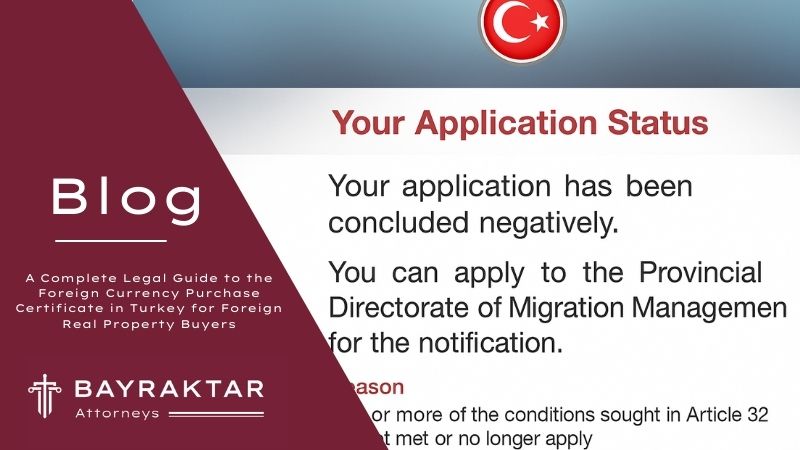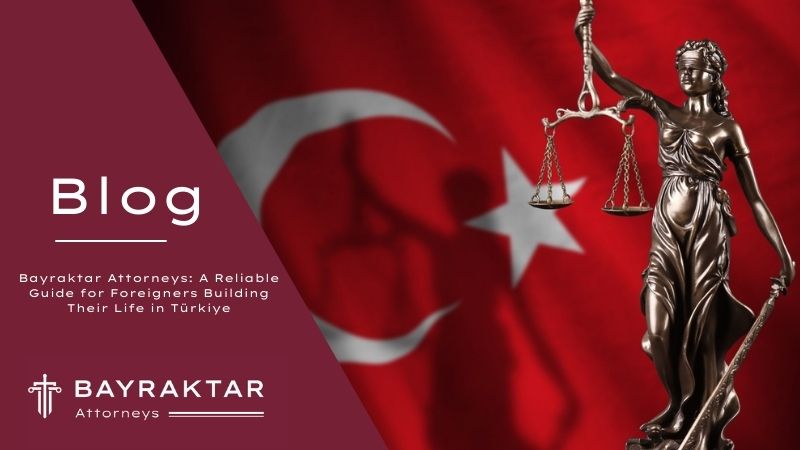
If you are a foreign national applying for a residence permit in Turkey, understanding Article 32 of the Law on Foreigners and International Protection (YUKK) is crucial. This article defines the legal reasons Turkish immigration authorities may reject an application—and these reasons are more common than you might think.
Especially in cities like Istanbul, Ankara, Antalya, and Izmir, where thousands of foreigners apply each month, immigration officers apply Article 32 with precision. Even a minor mistake can lead to a full rejection. At Bayraktar Attorneys, we have helped many clients respond effectively to residence permit rejections under Article 32, often overturning unfair or misunderstood decisions.
In this blog, we explain what Article 32 covers, the most common reasons for rejection, and the legal options available if your application is denied.
What Is Article 32?
Article 32 of the Law on Foreigners and International Protection outlines the legal grounds on which a residence permit application may be refused. These include problems with documentation, legal entry issues, security concerns, or failure to prove the purpose of stay.
Understanding this article can help you prepare a stronger application—or defend yourself if you face a rejection.
Most Common Reasons for Residence Permit Rejection under Article 32
1. Missing or Invalid Passport or Travel Document
Applications are often denied if:
- The passport is expired or will expire within 60 days of the intended residence period
- No passport is submitted
- The passport is identified as fake or altered
2. Entry Ban or Immigration Violation
If you have been:
- Banned from entering Turkey for overstaying or violating visa rules
- Deported in the past and the ban is still active
Then your application will be rejected under Article 32.
3. Public Order or National Security Risk
Turkish authorities have the right to reject any applicant who is considered a risk to:
- Public security
- Public order
- National safety
This includes individuals with criminal records or suspected ties to criminal networks or terrorist organizations.
4. Public Health Risks
Applications may be denied if the applicant:
- Has a contagious disease that poses a risk to public health in Turkey
- Cannot provide health clearance when requested by authorities
5. Inadequate Financial Means
To live in Turkey, applicants must prove they have enough income or financial support. Common problems include:
- No bank statements or income documents
- Inconsistent or insufficient financial information
- No clear explanation of how living expenses will be covered
6. Lack of Valid Health Insurance
Every residence permit applicant must have valid health insurance for the entire duration of their stay. Applications are rejected when:
- Insurance is missing
- Insurance is expired or does not cover the full stay period
- The policy is from a provider not recognized by Turkish authorities
7. Inability to Prove Purpose of Stay
You must provide documents that explain why you are staying in Turkey. Reasons like tourism, study, family reunion, or real estate investment must be supported by:
- Proof of address
- Rental contracts or TAPU (ownership deed)
- Enrollment in a school
- Business licenses or company papers
What to Do If Your Residence Permit Is Rejected Under Article 32
If you receive a rejection notice, it is important to stay calm and act quickly. Here are your legal options:
1. Read the Rejection Decision Carefully
The reason for rejection will be clearly stated. Use this to identify what went wrong and what can be corrected.
2. File an Administrative Objection
You can submit a written objection to the immigration office that handled your application. In your objection, you must:
- Correct any errors or omissions
- Provide missing documents
- Explain your case clearly and legally
3. Appeal to the Administrative Court
If your objection is denied, you may file a lawsuit at the Administrative Court. This is a formal legal process and should be done with the help of a licensed immigration lawyer.
4. Reapply with Corrected Documents
Sometimes, the best course is to correct the problem and reapply. This is common in cases where the rejection is due to missing financial proof, invalid insurance, or incomplete explanations.
5. Get Legal Support
Turkish immigration laws are detailed and often change. Sometimes internal memos or seasonal policy shifts can affect which permit types are likely to be approved. Having a lawyer ensures that you:
- Understand the current policy climate
- Submit a legally strong application
- Avoid future rejections
Real-World Scenario: How Bayraktar Attorneys Helped
One of our clients from India was rejected under Article 32 due to "inadequate financial proof." The client had submitted personal bank statements but failed to include a notarized rental contract and health insurance. We submitted an administrative objection with updated financial proof, a valid lease agreement, and health coverage from a Turkish insurer. The rejection was overturned in less than four weeks.
How to Avoid Rejection from the Start
At Bayraktar Attorneys, we help clients prepare strong residence permit applications by ensuring:
- All documents are complete and valid
- Your purpose of stay is clear and provable
- Financial and health insurance documents are sufficient
- You submit before your visa or current permit expires
Final Thoughts
Article 32 is a powerful tool for Turkish immigration authorities—but it does not have to be the end of your journey. With professional legal support and correct documentation, most rejections can be avoided or reversed.
If you are applying for a residence permit in Turkey—or have been rejected under Article 32—Bayraktar Attorneys is ready to help.
Need Legal Help with a Residence Permit Issue?
Contact Bayraktar Attorneys today for reliable, experienced guidance on residence permit applications, rejections, and appeals under Turkish law.







